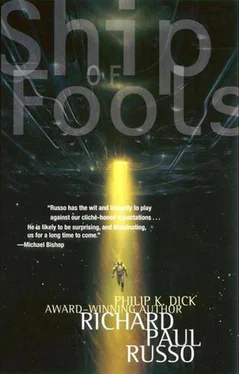I am almost sure that my deformities were known well before my birth, but for some reason I was not aborted (the Church’s strictures against abortion did not seem to stop most convenience terminations). I imagine there are a number of people who later regretted that decision, whatever the reasons for it at the time. This always gave me some degree of satisfaction.
The people who were my parents may still be alive. I doubt that it would have been difficult to discover who they are, or were, but I never tried. They decided to abandon me at birth, so I have returned the favor throughout my life. As far as I am concerned, they no longer exist, and never did.
PÄRwas talking mutiny.
There was no other word for it. The thought filled me with both excitement and fear.
We met again, this time in the Snow Gardens, which were currently out of season. There was no snow on the ground, and the trees were completely bare, without even a dusting of frost or ice. But the air was cold, burning the nose and biting at the lungs. We walked through a forest of skeletal trees, the dead dry leaves and branches cracking and snapping under our boots.
“There are a lot of people who want to leave the ship,” Pär said when we were deep into the woods.
“Where are they going to go?” I asked disingenuously. “Out the air lock?”
Pär scowled up at me. “When we reach Antioch. You know that’s what I mean.”
“Temporarily, or permanently?”
“Permanently.”
“It may not be habitable.”
“It probably is, though, isn’t it?”
“Yes,” I admitted. “But even if it is habitable, we don’t know what we’ll find.”
“It doesn’t matter. These people will want to leave the ship under any and all circumstances. Join those already living there, in the extremely unlikely event we find anybody, or start their own settlement if the place is deserted. They won’t care about hardships. Anything to get off this damned ship. Permanently.”
“Downsiders,” I said.
Pär nodded.
We walked on in silence for a while, our breaths like disintegrating smoke. The Snow Gardens appeared to go on for kilometers when they were in season and there was snow everywhere, the ground blanketed and the densely leaved trees heavy with snow and ice. But now the boundaries were visible—the gray walls enclosing the gardens, which were in need of basic maintenance; the dark ceiling high above us, pitted and cracked, appearing nothing at all like the vast and open sky it was in season with chaotic cloud images moving across its surface.
We neared a wall and changed direction. Directly ahead of us was a half-burned tree, branches and trunk charred and broken.
“There would need to be a vote,” I finally said to him.
Pär snorted. “Yeah, but what kind? None of the downsiders would be voting.”
“That’s true,” I said. “On the other hand, the vote would be taken not by the Executive Council, but by the full Planning Committee.”
“Either one, we know how that vote would go.”
“It depends on the circumstances.”
“Crap,” Pär said with disgust. “They’d never agree to let people leave. Especially not downsiders. They need them to do the scut work—cleaning and maintenance, all the manual labor this ship needs, and needing more all the time. Not to mention providing the servants for you all.”
He was right, of course. Over the years, the issue had come up several times in Executive Council sessions as well as in other informal discussions. With few exceptions, no one wanted to allow the downsiders to leave, unless the upper-level residents were to also leave the ship, which was as unlikely as finding anyone alive in this solar system. Those in the upper levels were afraid to leave the Argonos after all these centuries; they were afraid they would lose the power and control they had over the downsiders. They were right to be afraid.
“We can help each other,” Pär eventually said.
“You said that once before.”
“And I mean it now as much as I did then.”
I wasn’t sure what he was after, or what he could offer in return, so I finally asked him.
“You have shipwide access,” he said, “full authority over all systems.”
“Not all,” I corrected. “I cannot launch weapons on my own. I cannot shut down life support. I cannot change or set course—”
Pär shook his head in dismissal. “You have access to everything we need.”
He said we. So he was with them, which I had already suspected. But I wondered if his we was meant to include me as well.
“Landing ships, supplies, all of that,” he went on. “We have people who can run the loaders and navigate the shuttles. But we’ll need access codes for the shuttles, ship’s stores, fuel allocation, launch coordinates…” He shook his head. “Too much we can’t do on our own.” He stopped and leaned against the charred tree trunk; a pair of violet-and-indigo butterflies rose from a scarred branch and fluttered away. Pär looked up at me. “We can’t do it without you.”
“Why should I?”
Pär stared at me. “Because it’s the right thing to do,” he finally said. “We all have rights, every person on this ship. Or we should . Downsiders have no rights. We should have the right to make this decision ourselves, to leave the ship or stay, as we choose . But we don’t.”
“Why should I risk helping you?” I asked.
He snorted then. “You mean, how would it be to your advantage?”
“Something like that.” I didn’t like it put so crudely, but I couldn’t argue his point.
Pär nodded; not in agreement, it seemed to me, but rather as if he’d expected as much.
“Your captain is in trouble. If he goes down, you go down with him. And he is almost certainly going down, no matter what we find. This is your way out.”
“How?”
“You go with us.”
“And if I don’t want to leave?”
“Will you really want to stay when the captain has been deposed? The way everyone on the Planning Committee and Executive Council, in fact nearly everyone in the upper levels, despises you?”
“Despises? Isn’t that a little harsh?”
“Harsh?” And here Pär smiled. “Yes. But it’s accurate. You must know that. You’ll have no power, no influence, and my guess is that all access will be cut off, all authority canceled. You’ll be nothing.” He pushed off from the tree and walked away. “Think about it,” he said without turning back.
I watched him walk deeper into the skeletal woods, watched my own breath form and dissipate over and over. Yes, I would think about his proposal. I had no choice.
THEdownsiders did all the scut work on the ship, just as Pär said. Although most of the ship’s systems were automated, and most of the machinery was self-maintaining and self-repairing, nothing was completely trouble-free, and much manual labor was needed to keep everything running. Cleaning, servicing, other kinds of maintenance. Also to run the manufacturing and fabrication equipment, the ag rooms, and countless other jobs. And more needed to be done each year as systems gradually faltered and broke down.
Costino and his staff were in charge of production and schedules, coordinating all the downsider work crews. I’d never been interested in the details, but I knew that much of the labor was exhausting, and some of it dangerous. People were occasionally killed. But someone had to do it. I did not make judgments one way or the other.
According to the ship’s history, as recorded by Toller and his predecessors, there had been periodic attempts by downsiders to change the way things were done. I had even heard vague stories of a massive revolt, called the Repudiation, associated with some kind of plague three or four centuries earlier. Such efforts had never been successful. I had been through one attempted insurrection myself, six years earlier. It did not last long.
Читать дальше












